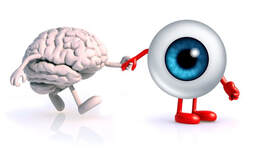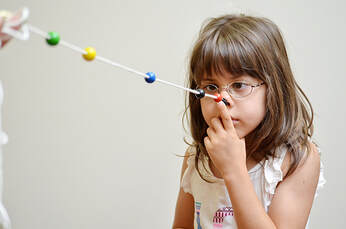Vision Therapy Services at Looking Forward Vision Therapy
|
Vision is more than seeing 20/20. An individual who has 20/20 eyesight does not necessarily have "good vision" if their visual system is not working efficiently. Vision Therapy treats vision problems that are not successfully treated using eyeglasses, contact lenses, or surgery alone.
Our visual system is biologically unsuited for the sustained near work demands of our culture. |
Many vision disorders are not necessarily primary problems, but rather adaptive changes to near point stress. Vision Therapy is the only treatment that addresses the underlying physiology of the eyes.
Vision Therapy can be extremely beneficial for children with special needs, learning differences or behavioral issues.
Vision therapy helps to develop or retrain the learned aspects of vision through the recently-understood concept of neuroplasticity. Due the brain’s amazing power of neuroplasticity, vision therapy is an effective treatment for adults, as well as children.
Vision Therapy is also an effective treatment for problematic vision issues in adults and children which are associated with medical conditions, such as concussion or other mild traumatic brain injury. If you are experiencing double vision, reading difficulties, headaches with visual tasks, difficulties with eye movement, vision therapy can help.
Vision Therapy can be extremely beneficial for children with special needs, learning differences or behavioral issues.
Vision therapy helps to develop or retrain the learned aspects of vision through the recently-understood concept of neuroplasticity. Due the brain’s amazing power of neuroplasticity, vision therapy is an effective treatment for adults, as well as children.
Vision Therapy is also an effective treatment for problematic vision issues in adults and children which are associated with medical conditions, such as concussion or other mild traumatic brain injury. If you are experiencing double vision, reading difficulties, headaches with visual tasks, difficulties with eye movement, vision therapy can help.
The following is a list of symptoms that may be indicative of a vision problem........
These are problems that are not easily identified during school vision screenings, and may not even be brought up at a routine eye exam. If you or your child are experiencing any of these symptoms, you may benefit from vision therapy.
- Blinking excessively or rubbing your eyes
- Reporting that things look blurry in the classroom
- Reporting that things look double
- Closing one eye often
- Getting headaches after doing schoolwork or reading
- Reporting that words run together when reading
- Avoid or dislike reading
- Having trouble copying work from the board to paper
- Losing your place when reading
- Skipping or rereading words or lines
- Trouble hitting a ball or misjudging a serve
- Previous head injury or concussion
- Having a short attention span
- Having frustration or anxiety associated with school or work
These are problems that are not easily identified during school vision screenings, and may not even be brought up at a routine eye exam. If you or your child are experiencing any of these symptoms, you may benefit from vision therapy.
|
What is Vision Therapy?
Vision therapy is a personalized treatment program that has been shown to be effective in treating many types of problems affecting the vision system. Vision therapy services include the diagnosis, treatment, and management of disorders and dysfunctions of the vision system. Vision therapy sessions include procedures designed to enhance the brain-eye connection, which leads to improved control of eye alignment, eye tracking, eye teaming, eye focusing abilities, eye movements, and visual processing. |
During vision therapy sessions, visual-motor skills are developed through the use of specialized optical devices, including therapeutic lenses, prisms, and filters. The patient builds endurance during therapy, and their acquired visual skills are reinforced. These visual skills are eventually made automatic through repetition and by integration with motor and cognitive skills.
Is there scientific evidence that shows that vision therapy works?
Yes! Numerous research studies have shown that Vision therapy is effective for improving many vision conditions. The Convergence Insufficiency Treatment Trial (CITT) is a well known study which showed that office-based optometric vision therapy is the most effective treatment for convergence insufficiency. There are numerous additional published research studies that prove the effectiveness of vision therapy for improving reading and learning performance.
Is there scientific evidence that shows that vision therapy works?
Yes! Numerous research studies have shown that Vision therapy is effective for improving many vision conditions. The Convergence Insufficiency Treatment Trial (CITT) is a well known study which showed that office-based optometric vision therapy is the most effective treatment for convergence insufficiency. There are numerous additional published research studies that prove the effectiveness of vision therapy for improving reading and learning performance.
More Vision Therapy Resources:
College of Vision Development (COVD) has a wealth of information on their website about vision therapy and it’s benefits. Optometrists.org is an extensive source of information about vision therapy, as well as general eye care.
All About Vision:Vision Therapy https://www.allaboutvision.com/parents/vision_therapy.htm
Optometrists Network 3D Vision https://www.vision3d.com/
College of Vision Development (COVD) has a wealth of information on their website about vision therapy and it’s benefits. Optometrists.org is an extensive source of information about vision therapy, as well as general eye care.
All About Vision:Vision Therapy https://www.allaboutvision.com/parents/vision_therapy.htm
Optometrists Network 3D Vision https://www.vision3d.com/
If you think you may benefit from Vision Therapy, here are the steps you need to take...
The first step is a comprehensive eye examination, to evaluate eyesight and ocular health. If it is determined that a more thorough evaluation of visual function is needed, the next step is a visual function evaluation.
The visual function evaluation provides information about visual performance, as well as orthoptics (the mechanics of eye movements). This evaluation is done in order to assess the binocular function of the eyes (how well the eyes work together), as well as to gather information about the brain-eye connection (to learn how well the brain and eyes work together). The results of the visual function evaluation will determine the appropriate options for treatment, depending on the diagnosis.
We refer our vision therapy patients to Dr. Cathleen Doucette at Looking Forward Vision Therapy. You can reach her by email: [email protected] or phone: (978) 969-2304.
The first step is a comprehensive eye examination, to evaluate eyesight and ocular health. If it is determined that a more thorough evaluation of visual function is needed, the next step is a visual function evaluation.
The visual function evaluation provides information about visual performance, as well as orthoptics (the mechanics of eye movements). This evaluation is done in order to assess the binocular function of the eyes (how well the eyes work together), as well as to gather information about the brain-eye connection (to learn how well the brain and eyes work together). The results of the visual function evaluation will determine the appropriate options for treatment, depending on the diagnosis.
We refer our vision therapy patients to Dr. Cathleen Doucette at Looking Forward Vision Therapy. You can reach her by email: [email protected] or phone: (978) 969-2304.
|
Dr. Cathleen Doucette graduated from the New England College of Optometry. She is affiliated with the AOA (American Optometric Association), the MSO (Massachusetts Society of Optometrists) and the COVD (College of Optometrists in Vision Development). After providing primary eye care for 25 years, and specializing in pediatrics and vision therapy since 2013, Dr. Doucette is now focused entirely on her specialty practice of vision therapy and vision rehabilitation.
As a behavioral optometrist, Dr. Doucette is passionate about helping patients improve their visual function so that they may not only experience more comfortable vision, but also realize their full potential in academics, sports, work, and life. |
Dr. Doucette enjoys working with pediatric and young adult patients and is excited to offer vision therapy services to the community.



